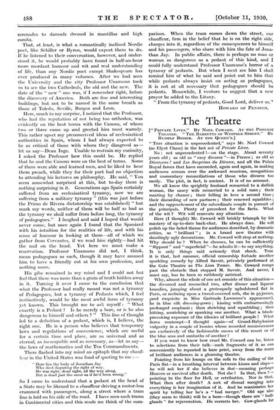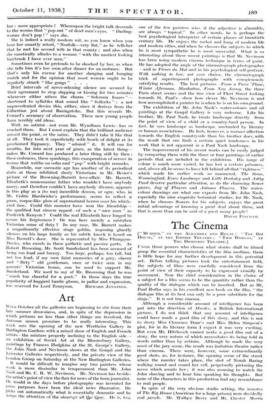The Theatre
[" PRIVATE LIVES." BY NOEL COWARD. AT THE Puoxxix THEATRE. "THE BARRETTS OF WIMPOLE STREET." BY RUDOLF BESIER. AT TILE QUEEN'S.] "Tins situation is unprecedented," says Mr. Noel Coward (as Flynt Chase) in the last act of Private Lives.
No: not unprecedented !—on the stage. About seventy years old ; as old as "easy divorce "—in France ; as old as Divorcons and Les Surprises du Divorce, and all the Palais Royal farces that have succeeded, again and again, in making audiences scream over the awkward reunions, recognitions and momentary reconciliations of those who divorce too easily. The plot, in fact, is ancient. It is of no account.
We all know the sprightly husband remarried to a dullish woman, the saucy wife remarried to a solid man ; their meeting by chance ; their falling in love a second time ; their discarding of new partners ; their renewed squabbles ; and the rapprochement of the subordinate couple in pursuit of the principals. Plenty of precedent for the facts. What of the wit ? Wit will renovate any situation.
Here (I thought) Mr. Coward will briskly triumph by his mastery of up-to-date back-chat. He always does. He will polish up the faded theme for audiences described, by dramatic critics, as " brilliant " ; in a brand new theatre with dazrlingly ugly decorations. Mr. Coward will stop at nothing. Why should he ? When he chooses, he can be sufficiently "flippant" and "superficial"—he admits it—to say anything. It is only things said seriously that shock. True it is that, last summer, official censorship forbade another sparkling comedy by Alfred Savoir, privately performed at the Gate Theatre as The Lion Tamer. Mr. Coward romps past the obstacle that stopped M. Savoir. And never, I must say, has he been so ruthlessly satirical.
Why, almost the whole of one act consists of this situation— the divorced and reconciled two, after dinner and liqueur brandies, jumping about a grotesquely upholstered flat in Paris, or reclining upon a tweed-covered sofa, she in pyjanias, (and exquisite in Miss Gertrude Lawrence's appearance), he in blue silk dressing-gown ; kissing with embarrassingly prolonged emphasis ; then shrieking and squabbling ; then hitting, scratching or spanking one another. What a blush- provoking exposure of the idiocies of brilliant people I What fierce contempt—I thought again—of Grand-Babylonian vulgarity in a couple of loonies whose recorded reminiscences are exclusively of the fashionable snows of this resort or of the blue seas and sunbaths of another
If you want to know how cruel Mr. Coward can be, listen to selections from their talk—such fragments of it as can conveniently be repeated in bare print, away from the roars of brilliant audiences in a gleaming theatre.
Pointing from his lounge on the sofa to the ceiling of the Paris flat—in a breathing interval between kisses and slaps— he will ask her if she believes in that—meaning perhaps Heaven or survival after death. Not she I In that, then ?- pointing to the floor for Hell, or retribution. Nor in that. What then after death? A sort of dismal merging into everything is her imagination of it. And he reaniniates her spirit by telling her he's a "bad merger." Old age also (they seem to think) will be a bore—though there are " bull- glands " for rejuvenation. He corrects her. Cow-glands for
her : more appropriate! Whereupon the bright talk descends to the worms that "pop Out" of dead men's eyes. Darling, worms don't pop ! " says she.
She is indeed a really modern wit, as you know when you hear her smartly retort, "Norfolk—very flat," as he tells her that he met his second Wife in that county ; and also when she caustically alludes to a woman "with the nastiest looking hairbrush I have ever seen."
Sometimes even he pretends to be shocked by her, as when she tells him it's too soon after dinner for an embrace. But that's only his excuse for another slanging and banging match and for the opinion that most women ought to be regularly struck "like gongs" Brief intervals of nerve-relaxing silence are secured by their agreement to stop slapping or kissing for two minutes whenever either utters the charm "Solomon Isaacs "— shortened to syllables that sound like " Sollocks " : a not unprecedented device this, either, since it derives from the Gilbertian jest about Basingstoke. But this reveals Mr. Coward's accuracy of observation. These new young people have terribly old ideas.
Well, no satirist—not even Mr. Wyndham Lewis—has so crushed them. But I must explain that the brilliant audience missed the point, or the satire. They didn't take it like that at all. They took it superficially with howls of delight at its proclaimed flippancy. They " adored " it. It will run for months, far into next year of grace, as the latest thing— unless Mr. Coward has produced a later thing still by then : these embraces, these spankings, this exasperation of nerves in worms that writhe on sofas and "pop" with bright remarks.
Meanwhile, our sarcastic age has another of its periodical stabs at those inhibited dusty Victorians in Mr. Besier's picture of the Browning-Barrett love-affair. Mr. Barrett, Elizabeth's monomaniac father who wouldn't have anybody marry, and therefore couldn't have anybody divorce, appears in this play as a (to me) incredible demon, or ogre, who, in Mr. Cedric Hardwicke's performance, seems to reflect a green, corpse-like glow of supernatural horror over his whisk- ered face. Could this monster have won the friendship— the qualified but sincere regard—of such a "nice loan" as Frederick Kenyon ? Could the real Elizabeth have longed to secure his forgiveness ? Or was hers merely a mistaken Victorian sense of duty ? In any case, Mr. Barrett makes a magnificently effective stage goblin, imposing ghastly silences on his large family as his subtle knock is heard on Miss Barrett's door. She is represented by Miss Ffrangcon- Davies, who excels in these pathetic and passive parts. As Robert Browning, Mr. Scott Sunderland has been accused of being too loud and breezy. Too large, perhaps, too tall, but not too loud, if my own faint memories of a grey, cheery and " flirty " old gentleman, once or twice seen in my parents' Victorian house, can be used to support Mr. Sunderland. We used to say of Mr. Browning that he was "much too cheerful for a poet." In those days the true Popularity of haggard bardic gloom, in pallor and expression,









































 Previous page
Previous page